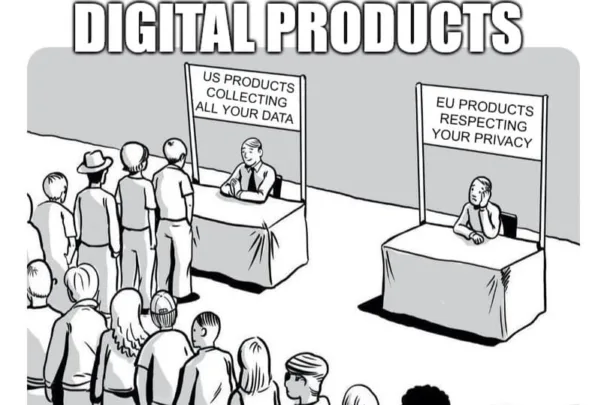There are a lot of good reasons to part ways with big US companies and the oligarchs behind them. With this post I want to remind you of a few important arguments for switching.
For many market leaders from the USA there are good European alternatives. Down below, I list some highlights.
The reasons to switch
Let’s break down the reasons into three intertwined branches.
Dependency
Given the current US administration one can envision a few scenarios where a dependency on US products could be fatal. Many oligarchs have already “bent the knee” to President Trump. Just look at the inauguration! They gave him monetary gifts and showed hasty obedience to his political agenda.
With rising geopolitical tensions, do you think it’s unlikely that the US-administration will cut access to US-products for European authorities? Well, think again, because it already happend. The Chief Prosecutor of the International Criminal Court in The Hague was banned from his Microsoft account after Israeli President Netanyahu was declared a war criminal by the International Criminal Court. I don’t think Europe is ready for more attacks of that nature. That being said, some countries are moving away from Microsoft products. This is good news, as Microsoft plays a huge role in European administrations and could paralyse authorities and cause critical data-loss.
Private companies are at risk as well. In the enduring trade wars they could fall behind their competition because of reliance on potentially banned US-products.
But not only targeted attacks are possible. Our dependency on critical Internet Infrastructure from the USA threatens the free internet for all.
Privacy
American companies are not bound to the GDPR laws if their servers are located outside of EU territory. Some people might feel save, because their data is encrypted before being stored on external servers. But some encryption methods are considered weak, as WhatsApp’s encryption for example. On other services there might be no encryption of private data at all. But even if, the metadata of encrypted entries reveals a lot of information too.
Even if you’re not concerned about being declared a political enemy or being under surveillance, you should keep your data protected as good as you can, because you expose yourself to manipulation attempts otherwise.
Manipulation
The manipulation of the latest US election and elections in Germany through biased algorithms on the microblogging platform formerly known as Twitter are well documented. Other platforms have algorithms that follow political agendas as well.
With (Gen)AI such manipulations can be achieved even more efficiently. The denial of the holocaust by Grok, that apparently was done through unauthorised (Elon Musk himself?) altercation of the AI, and the more recent racist outbursts of Grok, show once again how dangerous it is to depend on the output of (Gen)AI, especially if it’s run by fascist individuals. As discussed above, american companies could follow orders by the US administration (or by their main stakeholders) to steer opinions or elections into certain directions.
The above works better the more people are using those products and the more data people are willing to share. Microtargeting is the name of the mechanism used by Cambridge Analytics already in 2016 to successfully manipulate the US election and the Brexit referendum.
The alternatives
For some products there are better European alternatives than one might think. european-alternatives.eu has an exhaustive database of digital products from the EU. Check it out.
On other products the market leadership is hard to break and makes a switch to an alternative seem unattractive due to network-effects. But if everyone uses this excuse no change can be achieved. Therefore: let’s go.
Below are some of my personal highlights for alternatives.
Alternatives for Alphabet (Google) products
Only in terms of traffic jam detection and Street-View Google Maps is superior to its open-source competitors. But the fact, that Google has this kind of data at hand should give us pause. Google seems to know more about our movements than all European departments of transport combined
I am more than happy with the alternatives. Organic Maps is my favourite when it comes to navigation on mobile. The app is less data-hungry as Google’s product and it loads faster as well.
Google collects a massive amount of data through their Mail service. It knows whom you’re writing with, when you’re writing and even what you write about. The latter caused controversies, because according personalised ads were a tad too spooky for a lot of users. These kind of ads have been retired. But surely, the data is still available to Google.
In my opinion, both alternatives are just as good as Google’s translation service.
Chrome has done a lot for the further development of web standards, but it remains (still) a product by Google. It’s to be treated with caution when it comes to privacy.
I’m happy with Vivaldi, which was founded by one of the Opera co-founders. Mullvad Browser makes a good impression as well. This is a Firefox fork. Firefox itself is an open-source product and also a good alternative to Chrome, even though they lag behind on implementing the latest Web-APIs and the company Mozilla is based in the USA.
A personal calendar contains a lot of personal data. That makes it all the more important to select a service that doesn’t collect all of it.
The European alternatives are just as good in my opinion. The entries of a Google Calendar can be exported easily. That makes the switch to an alternative pretty straight forward.
Youtube is full of spammy ads and the algorithm shows us heaps of AI-generated videos with Fake-News.
But I’ll admit, there’s no alternative available that has this variety of videos. If you’re making videos that are supposed to be embedded on another website, use alugha or Jet-Stream.
Please also check if the videos you’re looking for are available on other video platforms.
The quality of Google search results has decreased steadily over the last few years. Lately, the results are also enhanced by AI-results without much added value. This wastes energy, especially because the AI results are given to you without asking for it.
That makes a move to Ecosia or Qwant all the more attractive. Ecosia claims to reinvest all profits for climate action and the search results are similar to what Google/Bing have to offer. Probably, because they use Google’s and Bing’s search index which makes the results vulnerable to potential US-bias and manipulation. Qwant and Ecosia are currently working together on building an independent search index.
Currently, both search engine are to be used with caution, because they forward personal data to Bing and, if you consent, also to Google. Additionally, Ecosia started to “enhance” their results with AI-generated answers. 🤨
If you’re looking for stronger privacy protection, use US search engine DuckDuckGo for now. DuckDuckGo has made privacy their main priority and claims to not store any personal information at all.
Alternative Social Media
As mentioned above, the election manipulations done on Twitter/X are well documented. Move to Mastodon. The atmosphere of communication is much nicer there anyway.
Bluesky is a decentral, open-source product with a pretty wide audience, which makes it recommendable too, even though the company resides in the US.
As mentioned above, even before the inauguration of Trump in January 2025, Meta did a few nasty far-right changes. Switch to the decentral alternative Pixelfed or share authentic picture of you on BeReal.
The best approach is to move away from WhatsApp as a group. Convince the majority of a group to move to another messenger and make yourselves at home there.
My suggestion is Signal, because it’s pretty the wide-ranging. The underlying non-profit foundation is from the USA, but at least they have stronger encryption. Almost no information would be available to authorities.
Threema or Wire are good European alternatives, they only lag behind in terms of reach.
Addional Highlights
To me it seems that LeChat is just as good as ChatGPT. ChatGPT still profits from its first-mover advantage. But I think that Europe’s alternative will catch up in terms of reach. If you must use (Gen)AI (which you should question), go with LeChat.
VPN services promise improved privacy when using a VPN, but ironically users share their entire internet traffic with the VPN provider. Therefore, it’s important to choose a reputable, European product.
Unsurprisingly, Mullvad VPN works well with Mullvad Browser. Proton VPN in combination with Vivaldi works well too.
Password management services Passbolt and Bitwarden are good alternatives to LastPass. You might need a little longer to set up. But that’s worth it, recent incidents suggest that they are more secure than LastPass.
On Xing you might not have as many interactions as on LinkedIn, but on the other hand that also means, you don’t have to scroll through as much AI-generated content. 😉
Highlights for developers
AWS => OVHCloud, UpCloud, Scaleway
Github => Gitlab, GitLabHost, Codeberg
Asana => OpenProject, Zenkit Projects, Taiga
Cloudflare => OVHCloud CDN, KeyCDN
reCAPTCHA => Friendly Captcha, Captcha Fox
Conclusion
We should make use of the available products from Europe. Many are not as popular as the US competition, but that is mainly because the competition can spend more money on expanding and still profits from a first-mover advantage.
I mainly listed alternatives I found on european-alternatives.eu, but also in other sections – like shopping or streaming – we have good alternatives from Europe at hand. Just look around next time, before you end up with using a product by Amazon. The money would stay in Europe as well then. 😉
- Meta allows hate speech against homo-/transsexuals, made every US instagram account follower of the US President und banned search results critical of Trump. Other Big Tech companies have rolled back DEI-rules as well.
- Denmark makes steps in the direction of digital sovereignty by switching from MS Office to LibreOffice. Administrations/Ministries of other countries are using LibreOffice as well. A contract between EU and NextCloud + LibreOffice should make future migrations to these providers less cumbersome.
- The most used Cloud services are owned by Big Tech companies, e.g. Amazon AWS, Microsoft Azure, Google Cloud und Apple iCloud. The most popular DNS service is from Google as well. Luckily, there are plans to get away from these services. Countries outside of the EU are discussing the risks of digital dependency too.
- https://geopoliticaleconomy.com/2025/01/21/big-tech-billionaires-trump-inauguration/ (last opened: 01.12.2025)
- https://nltimes.nl/2025/05/20/microsofts-icc-email-block-triggers-dutch-concerns-dependence-us-tech (last opened: 01.12.2025)
- https://www.axios.com/2025/06/23/whatsapp-house-congress-staffers-messaging-app (last opened: 01.12.2025)
- https://www.cyberly.org/en/what-is-metadata-and-why-is-it-a-privacy-concern/index.html (last opened: 01.12.2025)
- https://arxiv.org/abs/2411.01852 (last opened: 01.12.2025)
- https://www.forbes.com/sites/esatdedezade/2025/01/21/meta-faces-backlash-as-democrat-related-terms-disappear-from-instagram/ (last opened: 01.12.2025) https://www.forbes.com/sites/esatdedezade/2025/01/21/meta-faces-backlash-as-democrat-related-terms-disappear-from-instagram/ (last opened: 01.12.2025)
- https://toolspedia.ai/news/grok-blames-programming-error-for-holocaust-denial/ (last opened: 01.12.2025)
- https://www.wired.com/story/grok-antisemitic-posts-x-xai/?utm_content=buffer75b4a&utm_medium=social&utm_source=bluesky&utm_campaign=aud-dev (last opened: 01.12.2025)
- https://www.researchgate.net/publication/340404940_The_Effects_of_Modern_Data_Analytics_in_Electoral_Politics_Cambridge_Analytica's_Suppression_of_Voter_Agency_and_the_Implications_for_Global_Politics (last opened: 01.12.2025)
- https://www.independent.co.uk/tech/google-stop-making-gmail-targeted-adverts-a7806886.html (last opened: 01.12.2025)
- https://www.theverge.com/23869483/us-v-google-search-antitrust-case-updates (last opened: 01.12.2025)
- https://blog.ecosia.org/eusp/ (last opened: 01.12.2025)
- https://propertyofthepeople.org/document-detail/?doc-id=21114562 (last opened: 01.12.2025)
- https://www.bloodinthemachine.com/p/the-tech-oligarchs-and-their-ai-are (last opened: 01.12.2025)
- https://en.wikipedia.org/wiki/LastPass#Security_incidents (last opened: 01.12.2025)
- https://www.wired.com/story/meta-immigration-gender-policies-change/ (last opened: 01.12.2025)
- https://www.euronews.com/next/2025/02/10/why-is-big-tech-ditching-dei-programmes-and-what-does-it-mean-for-workplaces-in-europe (last opened: 01.12.2025)
- https://www.zdnet.com/article/why-denmark-is-dumping-microsoft-office-and-windows-for-libreoffice-and-linux/ (last opened: 01.12.2025)
- https://2-data.com/a-search-for-digital-sovereignty-eu-governments-shift-from-microsoft-to-linux-libreoffice/ (last opened: 01.12.2025)
- https://www.edps.europa.eu/press-publications/press-news/press-releases/2023/edps-pilot-use-open-source-software_en (last opened: 01.12.2025)
- https://eandt.theiet.org/2025/03/17/eu-tech-companies-call-action-reduce-reliance-foreign-owned-digital-infrastructure (last opened: 01.12.2025)
- Canada for example: https://www.policyalternatives.ca/news-research/canada-should-build-public-cloud-infrastructure-rather-than-relying-on-u-s-tech-giants/ (last opened: 01.12.2025)



